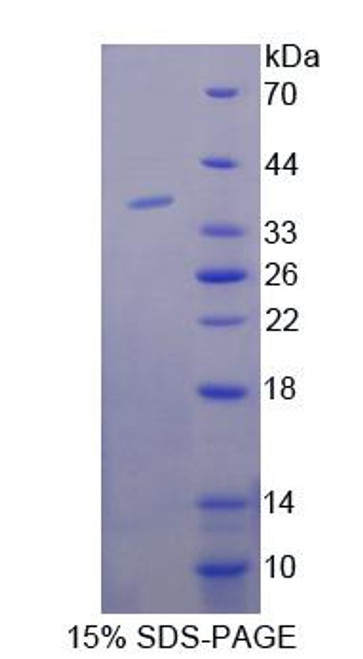Product Description
Human Tensin-3 (TNS3) ELISA Kit | AE13857HU | Abebio
Species Reactivity: Human (Homo sapiens)
Abbreviation: TNS3
Alternative Name: DKFZp686K12123; DKFZp686M1045; FLJ13732; FLJ35545; H_NH049I23.2; MGC88434; TEM6; TENS1; H_NH0549I23.2|OTTHUMP00000082709|tensin-like SH2 domain containing 1|tensin-like SH2 domain-containing 1|thyro
Application: ELISA
Range: Request Information
Sensitivity: Request Information
Intra-Assay: ≤5.4%
Inter-Assay: ≤7.8%
Recovery: 0, 93
Sample Type: Serum, Plasma, Other biological fluids
Detection Method: Sandwich
Analysis Method : Quantitive
Test Principale: This assay employs a two-site sandwich ELISA to quantitate TNS3 in samples. An antibody specific for TNS3 has been pre-coated onto a microplate. Standards and samples are pipetted into the wells and anyTNS3 present is bound by the immobilized antibody. After removing any unbound substances, a biotin-conjugated antibody specific for TNS3 is added to the wells. After washing, Streptavidin conjugated Horseradish Peroxidase (HRP) is added to the wells. Following a wash to remove any unbound avidin-enzyme reagent, a substrate solution is added to the wells and color develops in proportion to the amount of TNS3 bound in the initial step. The color development is stopped and the intensity of the color is measured.
Product Overview: Tensin-3 formed a complex with focal adhesion kinase and p130Cas (BCAR1) in human breast carcinoma cells. Addition of EGF to these cells induced dephosphorylation of FAK and p130Cas, leading to dissociation of the tensin-3/FAK/p130Cas complex and enhanced interaction between tensin-3 and EGFR. The deduced 1, 445-amino acid protein has a calculated molecular mass of 155.3 kD. Like other tensins, tensin-3 has an N-terminal actin-binding domain and C-terminal SH2 and PTB domains. It also has several potential tyrosine phosphorylation sites. Northern blot analysis detected high expression of an 8-kb transcript in kidney and placenta, with weaker expression in heart, skeletal muscle, spleen, liver, and lung. Western blot analysis revealed a 180-kD tensin-3 protein in human endothelial and epithelial cells and fibroblasts.
Stability: The stability of ELISA kit is determined by the loss rate of activity. The loss rate of this kit is less than 5% within the expiration date under appropriate storage condition. The loss rate was determined by accelerated thermal degradation test. Keep the kit at 37°C for 4 and 7 days, and compare O.D.values of the kit kept at 37°C with that of at recommended temperature. (referring from China Biological Products Standard, which was calculated by the Arrhenius equation. For ELISA kit, 4 days storage at 37°C can be considered as 6 months at 2 - 8°C, which means 7 days at 37°C equaling 12 months at 2 - 8°C) .
 Euro
Euro
 USD
USD
 British Pound
British Pound
 NULL
NULL












